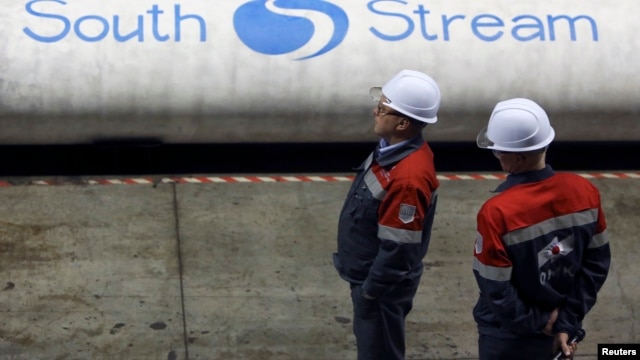Employees
stand near pipes made for the South Stream pipeline at the OMK metal
works in Vyksa in the Nizhny Novgorod region, April 15, 2014.
April 16, 2014
ISTANBUL
— Russia's controversial South Stream pipeline, which would transport
gas via the Black Sea into Europe towards the end of the decade,
received support from Turkey on Wednesday when Ankara said it may let
the conduit pass through its territory.
Turkey would consider granting access for the line if Moscow made such a request, Energy Minister Taner Yildiz said.
The subject is one of a series of issues including increased gas supply, gas price revisions and nuclear power that Turkey and Russia are set to discuss during talks in Ankara next week, according to Turkish officials.
The future of the 2,400-km (1,490-mile) line from Russia via the Black Sea to Bulgaria and from there further into the European Union, avoiding Ukraine, has been cast into doubt because of Russia's annexation of Crimea from Ukraine.
The Ukraine crisis has intensified EU efforts to reduce energy dependence on Russia, while Moscow has long sought to curb its reliance on Ukraine as the main pipeline route for sending Russian gas to Europe, its biggest market.
The European commissioner for energy, Guenther Oettinger, said in March that discussions with Russia over South Stream's regulatory approval in the European Union were on hold.
The EU delay could offer an opportunity to Turkey, where gas demand is rising fast.
“We are open to assessing any request for the line to pass through Turkey's territory,” Yildiz told reporters when asked about South Stream.
“It is said that there could be such a demand. If there is a request, we will consider it,” said Yildiz, due to hold talks with Alexander Medvedev, deputy head of Russian state-controlled Gazprom, in Ankara on Monday.
South Stream would carry around 60 billion cubic meters (bcm) of gas a year to Europe towards the end of the decade, enough to meet more than 10 percent of its annual demand.
Officials said Russia's annexation of Crimea created a risk for Turkey, noting 12.5 percent of its gas supplies passed through Ukraine, and that steps to prevent a supply problem could be on the agenda next week.
In a letter to European leaders last week, President Vladimir Putin warned Russia would cut natural gas supplies to Ukraine if it did not pay its bills and said this could lead to a reduction of onward deliveries to Europe.
To eliminate such transit risk for Turkey, Ankara proposes to have South Stream enter land in the Thrace region of northwest Turkey rather than Bulgaria, to avoid routing it directly from Russia into an EU country.
“That way Russia will be able to feed directly with the line the Marmara region of Turkey, which has the highest level of consumption,” said an analyst, who declined to be identified.
The construction of a second Blue Stream pipeline, complementing an existing one that runs under the Black Sea from Russia to central Turkey, could also come onto the agenda soon, sources close to the matter said.
Turkey would consider granting access for the line if Moscow made such a request, Energy Minister Taner Yildiz said.
The subject is one of a series of issues including increased gas supply, gas price revisions and nuclear power that Turkey and Russia are set to discuss during talks in Ankara next week, according to Turkish officials.
The future of the 2,400-km (1,490-mile) line from Russia via the Black Sea to Bulgaria and from there further into the European Union, avoiding Ukraine, has been cast into doubt because of Russia's annexation of Crimea from Ukraine.
The Ukraine crisis has intensified EU efforts to reduce energy dependence on Russia, while Moscow has long sought to curb its reliance on Ukraine as the main pipeline route for sending Russian gas to Europe, its biggest market.
The European commissioner for energy, Guenther Oettinger, said in March that discussions with Russia over South Stream's regulatory approval in the European Union were on hold.
The EU delay could offer an opportunity to Turkey, where gas demand is rising fast.
“We are open to assessing any request for the line to pass through Turkey's territory,” Yildiz told reporters when asked about South Stream.
“It is said that there could be such a demand. If there is a request, we will consider it,” said Yildiz, due to hold talks with Alexander Medvedev, deputy head of Russian state-controlled Gazprom, in Ankara on Monday.
South Stream would carry around 60 billion cubic meters (bcm) of gas a year to Europe towards the end of the decade, enough to meet more than 10 percent of its annual demand.
Officials said Russia's annexation of Crimea created a risk for Turkey, noting 12.5 percent of its gas supplies passed through Ukraine, and that steps to prevent a supply problem could be on the agenda next week.
In a letter to European leaders last week, President Vladimir Putin warned Russia would cut natural gas supplies to Ukraine if it did not pay its bills and said this could lead to a reduction of onward deliveries to Europe.
To eliminate such transit risk for Turkey, Ankara proposes to have South Stream enter land in the Thrace region of northwest Turkey rather than Bulgaria, to avoid routing it directly from Russia into an EU country.
“That way Russia will be able to feed directly with the line the Marmara region of Turkey, which has the highest level of consumption,” said an analyst, who declined to be identified.
The construction of a second Blue Stream pipeline, complementing an existing one that runs under the Black Sea from Russia to central Turkey, could also come onto the agenda soon, sources close to the matter said.








No comments:
Post a Comment
Hello and thank you for visiting my blog. Please share your thoughts and leave a comment :)